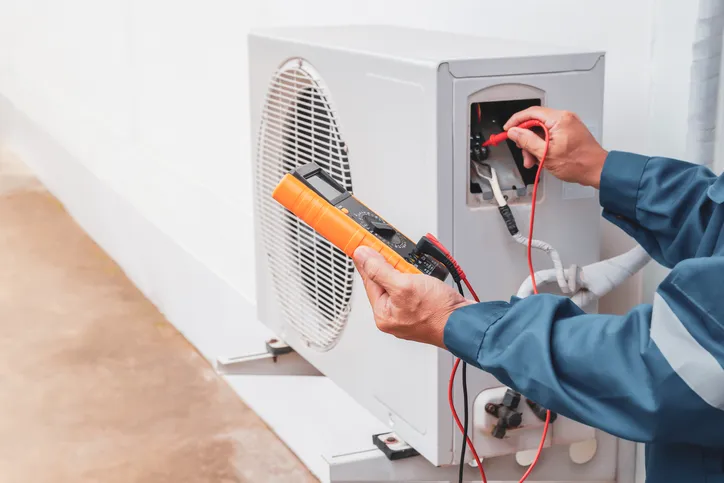Garage Heating & Air Conditioning in Sautee Nacoochee, GA
Upgrade your comfort with garage heating & AC services in Sautee Nacoochee, GA. Res Air LLC ensures quality work. Schedule your service appointment today!
Keeping your garage comfortable year-round in Sautee Nacoochee, GA means addressing both temperature and humidity. With hot, humid summers and cool, occasionally freezing winters in the North Georgia mountains, an unconditioned garage can become a source of rust, mold, vehicle wear, and an uncomfortable workspace. This guide explains practical garage HVAC solutions, common problems for local homes, recommended equipment options, the installation process, ventilation and safety essentials, energy-efficiency strategies, and realistic maintenance plans to keep a conditioned garage performing reliably.
Why condition a garage in Sautee Nacoochee
- Humidity control prevents rust on cars, corrosion on tools, and mold on stored items during our humid summers.
- Moderate winters still require frost prevention for vehicles and comfortable year‑round workshop use.
- Many local homes have attached garages or finished spaces above garages; conditioning the garage reduces heat transfer and increases overall home comfort and efficiency.
- Protecting hobby equipment, woodworking tools, and classic cars is especially important in a community with workshop and restoration enthusiasts.

Common garage HVAC problems in Sautee Nacoochee homes
- Large temperature swings between day and night, leading to condensation on vehicles and tools.
- High summer humidity causing mildew and musty odors.
- Ineffective heating from portable heaters that drive up energy costs or create safety hazards.
- Poor insulation and leaky garage doors that negate HVAC benefits.
- Short cycling of equipment when units are oversized for the relatively small garage space.
Service types and recommended equipment
Choosing the right solution depends on garage size, insulation level, desired comfort, and whether you need heating only or both heating and cooling.
- Ductless mini-splits (heat pump)
- Pros: High efficiency, indoor air comfort and dehumidification, easy to zone, wall- or ceiling-mounted avoiding ductwork.
- Cons: Initial cost higher than basic electric heaters, requires outdoor unit placement and modest electrical upgrade in some cases.
- Best for: Attached garages, workshops, and finished spaces that need full climate control year-round.
- Packaged units and through-the-wall systems
- Pros: All-in-one units can provide efficient cooling and heating without indoor components; useful for garage conversions.
- Cons: Require a wall opening and proper mounting; may have aesthetic considerations.
- Best for: Detached garages or where a simpler, contained solution is preferred.
- Electric resistance heaters (baseboard or forced-air)
- Pros: Lower upfront cost, simple installation, no combustion.
- Cons: Higher operating costs during cold snaps, limited to heating only, minimal dehumidification.
- Best for: Occasional-use garages or small spaces needing supplemental heat.
- Gas or propane heaters
- Pros: Strong heating output and lower operating costs in some cases.
- Cons: Require proper ventilation and combustion air; safety and carbon monoxide concerns; local codes may limit use in attached garages.
- Best for: Detached garages with proper venting and code-compliant installations.
- Radiant floor heating or electric mats
- Pros: Comfortable, quiet, and effective at preventing slab condensation; great for workshop floors.
- Cons: Higher installation complexity and cost if retrofitting an existing slab.
- Best for: New builds or major garage remodels where slab work is planned.
Assessment and installation process
A reliable installation follows clear diagnostic and safety steps to match equipment to your needs.
- Site assessment
- Measure the garage volume, ceiling height, door area, and insulation levels (walls, ceiling, slab).
- Identify attached vs detached status, shared walls with conditioned living space, and electrical capacity.
- Load calculation
- Perform a simplified Manual J-style calculation to determine heating and cooling loads—this prevents oversizing and ensures efficient operation.
- Insulation and sealing plan
- Recommend upgrades: garage door insulation, wall/ceiling cavity insulation, weatherstripping, and sealing gaps around windows and service penetrations.
- Equipment selection
- Choose the unit type that balances comfort, safety, and energy cost for your specific garage use and local climate.
- Installation steps
- Proper mounting and placement of indoor and outdoor components, routing condensate and refrigerant lines as required, electrical or gas hookups by licensed professionals, and any required venting or combustion-air provisions.
- Commissioning
- System start-up, thermostat setup, refrigerant charge verification, airflow checks, and user walkthrough to explain operation and safety features.
- Permits and inspections
- Verify local permit requirements with Sautee Nacoochee / White County codes; combustion appliance installations and electrical upgrades commonly require inspection.
Ventilation and safety considerations
Safety and air quality are critical when conditioning garages, especially in homes where cars or gas-powered equipment are present.
- Carbon monoxide (CO) safety
- Never rely on the HVAC system for CO protection. Install CO detectors outside the garage and in adjacent living spaces per local code.
- If using gas heaters, ensure proper combustion air and venting and follow manufacturer and code requirements.
- Make-up air and exhaust
- If the garage is used for vehicle idling or fumes, install dedicated exhaust or ventilation fans to remove pollutants.
- Consider timered or humidity-triggered fans to manage moisture and odors without continuous energy use.
- Filtration and indoor air quality
- Use medium-efficiency filters for ducted systems or change/clean mini-split filters regularly to reduce dust and airborne contaminants.
- Electrical and clearance
- Maintain clearance around outdoor compressor units and ensure electrical panels can safely handle any added load.
Energy-efficiency tips for local homeowners
- Improve insulation first; a well-sealed garage reduces the size of equipment needed and lowers operating costs.
- Insulate or replace the garage door and add weatherstripping to reduce infiltration.
- Use a programmable or smart thermostat with setback controls—reduce conditioning when the garage is not in active use.
- Zone the garage separately from the house so you only condition the space you need.
- For workshops, favor dehumidification-capable systems (heat pumps or ductless minis) to protect tools and finishes.
- Consider heat pump options for both heating and cooling efficiency during Sautee Nacoochee’s moderate winter temperatures.
Maintenance plan to keep a conditioned garage comfortable
Regular maintenance keeps performance high, operating costs lower, and equipment life longer.
- Seasonal tune-ups (spring and fall)
- Check refrigerant, clean coils, verify electrical connections, and test thermostat operation.
- Monthly or quarterly tasks
- Clean or replace filters, clear debris around outdoor units, and inspect condensate drains and pans.
- Annual checks
- For gas systems, inspect venting and combustion components and test CO detection systems.
- For slab or radiant systems, check controls and insulation integrity if accessible.
- User upkeep
- Keep doors and weatherstripping in good repair, avoid storing flammable materials near heating equipment, and monitor humidity to prevent condensation-related issues.
Final considerations
A properly designed and installed garage heating and air conditioning system in Sautee Nacoochee, GA protects vehicles and valuables, creates a usable year-round workspace, and improves adjacent home comfort when garages share walls with living areas. The most cost-effective results come from pairing targeted equipment—often a ductless mini-split or packaged heat pump—with solid insulation, ventilation planning, and an ongoing maintenance routine suited to our regional humidity and temperature patterns. Verify local code requirements for combustion appliances and electrical upgrades to ensure a safe, efficient installation that fits your garage use and lifestyle.
Take the Next Step Toward a Comfortable Garage
Don’t let your garage become a source of discomfort, wasted energy, or damage to your tools and vehicles. With the right heating and cooling solution, you can transform it into a safe, efficient, and comfortable space year-round. Res Air LLC specializes in tailored garage HVAC systems that fit the unique climate challenges of Sautee Nacoochee, GA. From ductless mini-splits to efficient packaged units, our team provides expert installation, maintenance, and guidance every step of the way. Contact Res Air LLC today to schedule your garage HVAC consultation and enjoy reliable comfort for years to come!


Financing
We make comfort affordable with flexible financing options through Optimus and Synchrony, giving you stress-free payment solutions for your HVAC needs.


Customer Testimonials
At Res Air, our customers’ satisfaction speaks louder than words. From fast emergency repairs to flawless system installations, homeowners trust us for reliable comfort and professional service.


.png)
.jpg)
